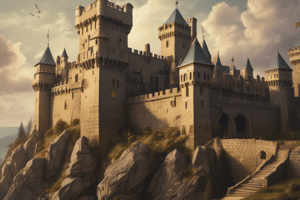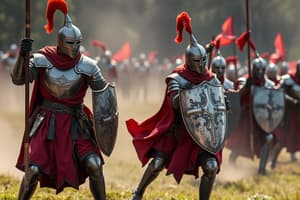Podcast
Questions and Answers
What was the main role of knights in medieval warfare?
What was the main role of knights in medieval warfare?
- To gain land and power within their own countries (correct)
- To serve as mercenaries for the highest bidder
- To replace their lords with new monarchs
- To protect the king from internal threats
At what age did training for knighthood typically begin?
At what age did training for knighthood typically begin?
- 16 years
- 14 years
- 10 years
- 7 years (correct)
What was the primary responsibility of a page during his training to become a knight?
What was the primary responsibility of a page during his training to become a knight?
- To act as a squire for a knight
- To study under the supervision of noblewomen (correct)
- To serve as an advisor to the king
- To lead a military unit in battles
How did the requirements for becoming a knight change by the thirteenth century?
How did the requirements for becoming a knight change by the thirteenth century?
What was a squire primarily responsible for during his training to become a knight?
What was a squire primarily responsible for during his training to become a knight?
What individual exercise did knights participate in to develop their lance skills?
What individual exercise did knights participate in to develop their lance skills?
In what type of event did tournaments often include mock battles between two opposing teams?
In what type of event did tournaments often include mock battles between two opposing teams?
How did audiences at tournaments identify knights?
How did audiences at tournaments identify knights?
What rules governed the design of coats of arms for knights?
What rules governed the design of coats of arms for knights?
What was expected of a chivalrous knight regarding women?
What was expected of a chivalrous knight regarding women?
Flashcards are hidden until you start studying
Study Notes
Medieval Warfare and Knights
- Medieval warfare broke out due to various reasons, including fighting for land, power, kings, and replacing monarchs.
- The most significant person on the battlefield was the knight, a warrior on horseback who fought for their king, lord, or for pay.
Becoming a Knight
- Early knights could be 'lowly born' men rewarded for bravery and skill in battle.
- By the 13th century, only men of noble birth could become knights, requiring years of training in military skills, service, and Christian teachings.
- Training began at age 7 as a page, studying under noblewomen to learn politeness, serving God, literacy, and riding.
- At 14, the page could become a squire, learning to care for armor, weapons, and horses, and continuing military and social training.
- Between 18-21, the young man was eligible for knighthood.
Tournament and Jousting
- Knights practiced fighting skills individually through exercises like 'tilting the quintain', and in organized tournaments.
- Tournaments featured violent events called mêlées, where two teams engaged in mock battles.
- Jousting was a popular part of tournaments, where two knights engaged in individual combat.
- Tournaments attracted large audiences, who enjoyed seeing who would be the hero of the day.
Heraldry and Coats of Arms
- Knights were identified by their coats of arms, symbols on shields, surcoats, and horse garments.
- Coats of arms followed heraldry rules, using up to five colors and two metals, with metals separating colors and colors separating metals.
Chivalry
- Knights were expected to live by the rules of chivalry, following proper behavior guidelines.
- A chivalrous knight was loyal to the Catholic Church, dedicated to helping the weak, brave in battle, and willing to fight to protect women.
Studying That Suits You
Use AI to generate personalized quizzes and flashcards to suit your learning preferences.




